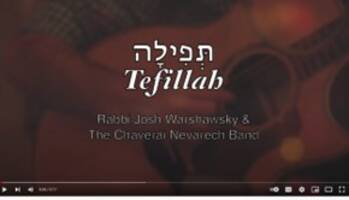A Water from the Well blog post, Parashat Shemot
Written by Rabba Kaya Stern-Kaufman
Dear Friends,
As we move into a new secular year, we turn the page into a new book of Torah this week. The book of Exodus/Shemot takes us on a journey from degradation to liberation, from servitude to sacred service. It is a transformational story that begins with pain and suffering, but whose generational patterns are disrupted by the prayers of the oppressed. It is communal prayer that sets the redemptive process into motion.
Below is a beautiful teaching on the nature of prayer in our tradition by my friend Rabbi Josh Warshawsky. Josh is a wonderful teacher and composer of sacred Jewish music. It is my pleasure to share his words on this week’s Torah portion, on the power of prayer, followed by a link to a beautiful new musical composition.
Listen and enjoy!
Shabbat Shalom,
Rabba Kaya
Shemot 5783 – Tefillah
by Rabbi Josh Warshawsky
 When was the first example of communal prayer in the Bible? There are tons of examples of individual prayer: from Hagar crying and calling out in the wilderness to Rebekah seeking God, Eliezer praying to his master Abraham’s God and Rachel calling out in her pain and later gratitude, but when did a group of people first gather to call out to God? The rabbis believe that it happened in this week’s parsha, Shemot. We read in the Torah:
When was the first example of communal prayer in the Bible? There are tons of examples of individual prayer: from Hagar crying and calling out in the wilderness to Rebekah seeking God, Eliezer praying to his master Abraham’s God and Rachel calling out in her pain and later gratitude, but when did a group of people first gather to call out to God? The rabbis believe that it happened in this week’s parsha, Shemot. We read in the Torah:
“וַיְהִי֩ בַיָּמִ֨ים הָֽרַבִּ֜ים הָהֵ֗ם וַיָּ֙מָת֙ מֶ֣לֶךְ מִצְרַ֔יִם וַיֵּאָנְח֧וּ בְנֵֽי־יִשְׂרָאֵ֛ל מִן־הָעֲבֹדָ֖ה וַיִּזְעָ֑קוּ וַתַּ֧עַל שַׁוְעָתָ֛ם אֶל־הָאֱלֹקִים מִן־הָעֲבֹדָֽה. וַיִּשְׁמַ֥ע אֱלֹקִים אֶת־נַאֲקָתָ֑ם וַיִּזְכֹּ֤ר אֱלֹקִים אֶת־בְּרִית֔וֹ אֶת־אַבְרָהָ֖ם אֶת־יִצְחָ֥ק וְאֶֽת־יַעֲקֹֽב׃” – שמות ב:כג
“A long time after that, the king of Egypt died. The Israelites were groaning under the bondage and cried out; and their cry for help from the bondage rose up to God. And God heard their moaning, and God remembered His covenant with Abraham and Isaac and Jacob.” – Ex. 2:34
The people of Israel were suffering and in pain, they called out in anguish, and God heard their cry! But what actually happened in this moment? The rabbis have a machloket, a disagreement, about this intense experience. In the Zohar, Rav Judah explains that, “of all the three expressions for prayer used in the Exodus narrative, crying out is the greatest of all because it is entirely a matter of the heart. Rabbi Berachiah said: When people pray and weep and cry so intensely that they are unable to find words to express their sorrow, theirs is the perfect prayer, for it is in their heart, and this will never return to them empty.”
At the same time, Rabbi Menachem Mendel Kasher, a medieval Biblical commentator, teaches a different midrash: “The children of Israel groaned and cried out to the Lord… Immediately the ministering angels recited, ‘Blessed are You, Adonai, who hears prayer.” Notice what he is doing here! This is an important shift towards fixed prayer. Rabbi Daniel Landes notes that “by having the angels recite a central line from the Amidah that will only be invented epochs later, the author of the midrash has the angels confirm the need for fixed prayer, that is, a set liturgy beyond spontaneous “crying out,” such as the Zohar would have it.”
We are still engaged in this ancient debate around fixed versus spontaneous prayer today. I believe communal prayer is collective emotion coupled with the ancient words of our tradition. We need both! Without emotion, our prayer is meaningless, it doesn’t affect us in any way. But the words of the siddur serve as a conduit, a channel, to give the words of our hearts direction and to unite our hearts with the hearts of those with whom we come together.
This song, Tefillah, is a hybrid Psalm. I took verses from different Psalms and brought them together around a theme. In the midst of the pandemic I was feeling alone and far from community, and I collected these verses and wrote a melody and a prose translation around what it might feel like to call out from that place of loneliness and hear a response.
This week, as we remember our ancestor’s first collective prayer, how can we unite our hearts around shared purpose, and sing out our own prayers and the prayers of those with whom we gather?
Shabbat Shalom,
Josh